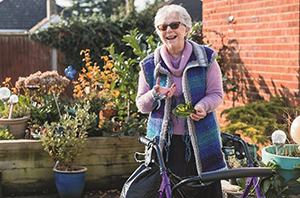Real-life stories of how access to rehabilitation and recovery can shape the course of people’s lives
Dominic's story: winning back independence in the pool
Promote and protect your aquatic physiotherapy service by sharing Dominic’s story #RightToRehab
Rehabilitation and recovery in the community is about much more than doing exercise.
For Dominic, who has cerebral palsy, it’s freedom. That’s how he describes being in the hydrotherapy pool.
Facilities like this, based in the community and in hospitals, enable people like Dominic to optimise their health and opportunities in life.
Lizzie's story: what happens when support isn’t in place?
Lizzie was a busy mum of two, a judge and keen runner, but in a moment all this changed forever.
Without warning, she suffered a life-threatening subarachnoid brain-haemorrhage and stroke. Lizzie needed life-saving brain surgery and just three weeks later was discharged home.
But discharge did not mark the end of the journey. Paralysed and blind, Lizzie now had an agonising seven-month wait for NHS community rehabilitation.
Lizzie had to pay privately for rehabilitation to help her learn to walk again, and to treat the many other health issues caused by her stroke.
The lack of available community rehabilitation contributed to the breakdown of her marriage. Lizzie’s condition left her with no choice but to retire from her job, leaving her with continued pain, depression and desperation.
Annette's story: enjoying the challenge of getting mobile

Despite living with a lung condition since childhood Annette, 67, was only introduced to pulmonary rehabilitation in 2017.
Annette has bronchiectasis, a lung condition that causes a persistent cough and excess phlegm. A permanent condition, it gets worse over time. She also has chronic obstructive pulmonary disease and clinical depression.
Pulmonary rehabilitation (PR) has had a significant impact on her quality of life. Similarly, community wellbeing sessions have helped Annette understand her depression and manage it.
It was the best thing that I have done. It helped me to understand my condition, how to improve it and, most importantly, how to manage it.
‘Learning how to belly breathe and managing walking to increase mobility and muscle strength takes the fear out of going out into the community and has helped me no end. In the past, I found it very depressing after an exacerbation as it felt like all the exercise I had been doing was lost. Now I take a deep breath and start again and enjoy the challenge of getting more mobile again.’
The importance of 'prehabilitation'
Community physiotherapy services also have a vital role to play in lowering health risks or preventing rapid deterioration in some patients’ conditions.
Notably, ‘prehabilitation’ is often implemented for those waiting to undergo surgery or other medical treatment. Cancer patients, for example, will be assessed and then supported to get them more physically active and improve their diet and psychological support. This improves the outcomes from cancer treatment, such as chemotherapy.